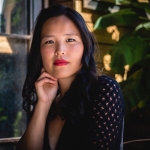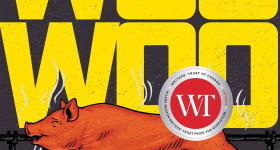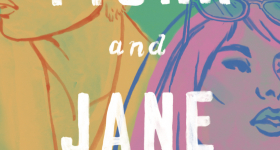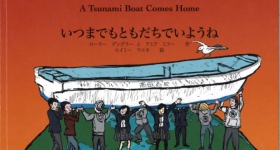Ocean Vuong’s Night Sky with Exit Wounds blooms with the sort of gorgeous lines that elicit that familiar, satisfied poetry grunt from audiences during readings. You know what I’m talking about if you’ve ever been to a great reading -- that kind of guttural assent that rises unbidden when one hears a line or an image that is really, really good -- when a line is so expertly crafted with regard to prosody, image and idea that it strikes a chord deep within, and you can’t help but respond. And yet, even as these poems enchant us with a kind of Orphic music, they bring us to reckon, unflinchingly with the underworld of violence and war:
[...] I didn't know the cost
of entering a song - was to lose
your way back.
So I entered. So I lost.
I lost it all with my eyes
wide open.
("Threshold")
The speaker alternates between speaking as the seeker and speaking as someone left behind, at some times Orpheus seeking to retrieve the lost from the underworld and at other times -- Eurydice trapped in the underworld: “If Orpheus were a woman I wouldn’t be stuck down here,” the speaker wryly comments in “Notebook Fragments.”
As these poems journey through the underworld of violence and injustice, they revisit trauma throughout personal and global history: from the escape of Vietnamese refugees during the fall of Saigon in 1975 to the murder of Michael Humphrey and Clayton Capshaw, a gay couple in Dallas, to the loss of a close friend. Throughout these poems, the speaker never abandons the reader to the trauma but walks alongside her, as he gently but powerfully testifies not to only the stakes of violence, but perhaps more remarkably, to the courage of choosing to live in the midst of such violence: “My mother said I could be anything // I wanted – but I chose to live,” the speaker says in “Thanksgiving 2006.” The speaker deals candidly with the stakes of choosing to live in the midst of a suffering world: anger, loss, loneliness -- though the latter of which, the speaker reminds us in “Someday I’ll Love Ocean Vuong” -- is “still time spent with the world.” In these moments of profound vulnerability, Vuong shows us pathways out of the underworld -- and that taking these paths does not mean escaping pain and darkness but to subsuming it, the same way that “light / keeps its shadow // by swallowing it” (“Into the Breach”).
The speaker reveals how, often at the heart of violence lies the yearning for transformation complicated by one’s feeling powerless to change: “I can say only in the dark / how one spring / I crushed a monarch midflight / just to know how it felt / to have something change / in my hands” (“My Father Writes From Prison”). The father who, as a young man who suffered the trauma of war, is also the man who “had / a hammer in his fist, mother / a nail-length out of reach” is the same man who lays his cheek compassionately to the side of a dolphin stranded on a beach. Vuong reveals to us that the desire to disappear or to make others disappear is sometimes a response to one’s confounded ability to be present, to live, to exist: “Don’t be afraid, the gunfire / is only the sound of people / trying to live a little longer / & failing,” he writes in “Someday I’ll Love Ocean Vuong.”
These poems owe their power not only to the striking images but the Vuong’s deft handling of mechanics of the line which are often simultaneously beautiful, wise and subversive.

Ocean Vuong
A former student of mine once described his understanding of the poetic device of enjambment as one line craving what follows in the next. It’s a description that’s always stuck with me, and which I think captures the ways in which Vuong crafts his line breaks -- as one line moves to the next, one senses the craving for life, despite violence and suffering: what war and human cruelty -- even the human instinct to survive -- have broken, Vuong sings back together. Take, for example, these lines from “Untitled (Blue, Green, and Brown): oil on canvas: Mark Rothko 1952”: Maybe we pray on our knees because god / only listens when we’re this close / to the devil.” It is in the line breaks that he dances with his readers; each enjambment is a small volta, turning the reader this way, then that, then perhaps in an entirely new direction, shifting her perspective with each turn. The economy of motion in his lines is astounding; one line propels itself into the next, bringing the reader along with it, transforming the world within one or two movements. In the Rothko poem, which seems to be an allusion to 9/11 – “The TV said the planes have hit the buildings” -- we begin on our knees in devotion and somehow and within two turns of phrase end up realizing how close we are to the devil -- and yet, not without hope, as the poem goes on to say:
The plans ... & I stood waiting in the roommade of broken mockingbirds. Their wings throbbinginto four blurred walls. & you were there.You were the window.
These compressed gems could stand on their own as poems and draw their power not only from the finesse with which Vuong orchestrates the mechanics of the line but the ways in which they resonate with a kind of deep knowledge that at once illuminates the specific context of the poem as well as the world beyond it. In “On Earth We’re Briefly Gorgeous,” Vuong writes, “For hunger is to give / the body what it knows // it cannot keep.” Each turn confounds expectation, and to recall “Threshold” -- causes us to lose our way back with our eyes wide open. Here’s what you think you know about the body, the poem seems to say; here’s how the body knows you, despite how the flesh “never fails // to fail / so accurately” (“Into the Breach”). His poems are prayers that lead us as much back into the body as beyond it, showing us that the only hope to overcome human suffering is to pass through it -- together. Here’s how, in a world seemingly overcome with the anonymity of loss and violence, we can touch each other to prove we’re still here, as Vuong reminds us in “On Earth We’re Briefly Gorgeous.” Here’s how the song goes on, these poems seem to say, here’s how we go on, despite our breaking.










Comments